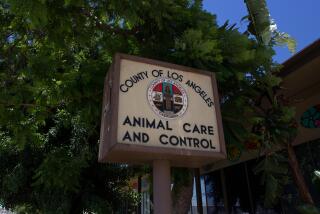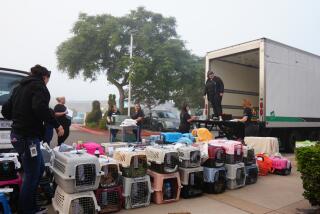Many of Cats Caught at Mobil Refinery Are Starving : Animals: After moving two dozen feral felines from Torrance property, trappers are switching to a feeding program.
- Share via
Many of the wild cats being moved from the Mobil Oil Corp. refinery in Torrance as part of a “catlift” are scrawnier and more malnourished than expected, say animal workers caring for the felines.
“These are the worst cats I’ve ever seen in terms of condition,” said Barbara Eustis-Cross, who oversees a Kern County ranch where the cats are being sent as part of the relocation project, which is supported by Mobil. “I’d say the best of these cats are in poor condition. The worst of these cats are emaciated. These cats are starving to death.”
So far, about two dozen of the estimated 75 to 100 wild cats roaming the refinery grounds have been relocated to the Kern County ranch, which is run by the LIFE (Life Is For Everything) Foundation.
The cats are proving so hard to catch, however, that trappers plan to halt their efforts for a few weeks. Instead, they will start feeding the felines regularly at spots around the refinery, and resume trapping when the cats begin to congregate at the feeding locations.
Mobil is concerned that the wild cats could damage refinery equipment. But cat lovers angrily protested last year when the oil company began trapping and removing cats, and four were destroyed.
So Mobil announced a new approach this spring: the catlift, which is being organized by Mobil, the Los Angeles SPCA and local volunteers. Mobil has donated $25,000 to build and maintain a cat habitat to house them at the Morningstar Ranch in Inyokern. The cats are being spayed or neutered as part of the project, which got under way this spring.
About 75 other cats also live at the ranch, taken there by other companies, individuals and humane groups.
Some cat lovers had urged that the cats be allowed to stay at the refinery, saying that moving them would simply encourage new cats to move in.
But Eustis-Cross said that after seeing the cats, she is convinced they needed to be removed from the refinery for their well-being. They were clearly not finding sufficient food on the refinery grounds, she said.
“This is long-term starvation,” Eustis-Cross said. “I’d say these cats have been under long-term stress. They just haven’t gotten the things they needed.”
Feral cats fending for themselves are believed to live only one to three years, said Ed Cubrda, president of the Los Angeles SPCA. They die from starvation, disease or accidents such as being hit by a car, he said.
Mobil spokesman Barry L. Engelberg said the corporation has always felt the most humane treatment for the cats was to capture and send them “to a place where they’d be able to live out the rest of their lives.”
At the Inyokern ranch, the Mobil cats are being fed dry and canned food as well as vitamins in syrup form and two types of digestive aids. About one-fourth of them are receiving antibiotics for respiratory problems, Eustis-Cross said.
The cats from Mobil include black and yellow cats, one Siamese and two Himalayans. Said Eustis-Cross: “These guys are absolutely beautiful.”
More to Read
Sign up for Essential California
The most important California stories and recommendations in your inbox every morning.
You may occasionally receive promotional content from the Los Angeles Times.













